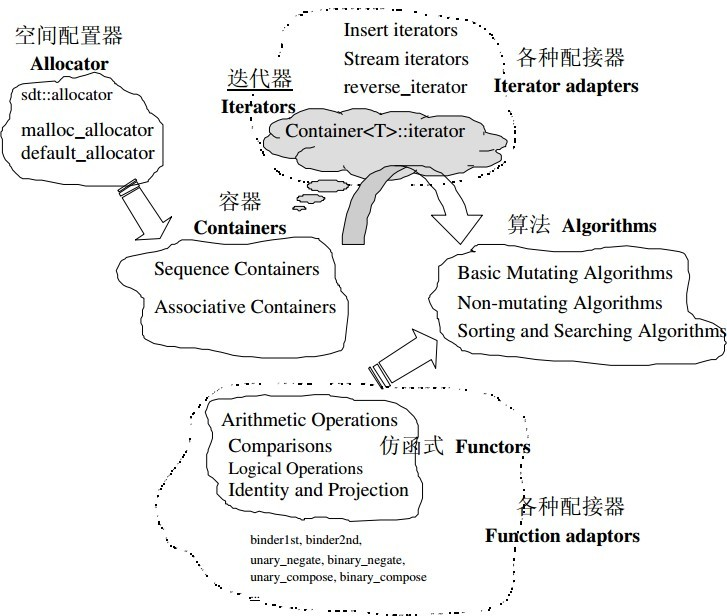标签:str stl源码剖析 iterator inter index == com soc 空间
《STL源码剖析》用来了解原理性的设计没什么问题,但是这本书实在太老,所有源码基于GNU2.9;现在语言的发展飞快,而且很多地方都是考虑兼容性等因素,设计非常复杂,也并不高效,我没有时间去搞明白所有实现,更没有时间实现标准库,所以只学了一小半就停了。
容器、算法、分配器、迭代器、适配器、仿函数。

分配器用来为容器分配内存,分配器是class,有成员函数allocate deallocate,调用operator new()会调用malloc,operator delete()调用free。
不同编译器的分配器实现稍有区别,不建议直接使用allocators,int* p = allocator<int>().allocate(512) 会创建临时对象,归还还要指定大小:allocator<int>().deallocate(p, 512)。
但malloc归还时不需要指定大小,因为malloc时候会有cookie保存分配的内存块大小,如果每次申请内存都包含cookie的话,开销太大,并且频繁申请内存十分耗时。
GNU2.9觉得allocators太傻逼,自己用的是alloc的分配器,有16个单链表,每个链表负责某个特定大小的内存块分配,比如8B(该链表串了很多8B的小内存块),16B,...,容器需要内存会被调整到8的倍数,去相应的链表找,如果链表没有小块内存,就会调用malloc向OS申请一块大的,切成很多小的,串起来去分配,这样malloc次数会变小很多,而且cookie会少很多,时间和空间开销都会变小,碎片也少了。
GNU4.9没有使用alloc,使用std::allocator,allocator继承了new_allocator,有成员函数allocate deallocate,调用operator new()会调用malloc,operator delete()调用free,一夜回到解放前。。。
4.9有很多扩展的分配器,2.9里的alloc变为了_pool_alloc,要改变默认的分配器,可以写vector<string, __gnu_cxx::_pool_alloc<string>> vec。
双向环状链表,end指向一个dummy node。
因为非连续,所以++iterator要重新设计,使得指向下一个元素,而不是错误的地址。
template<class T>
struct __list_node {
typedef void* void_pointer;
void_pointer prev; // 4.9 struct __list_node* prev
void_pointer next; // 4.9 struct __list_node* next
T data;
};
template<class T, class Ref, class Ptr>
struct __list_iterator {
// 5种associated types
typedef __list_iterator<T, Ref, Ptr> self;
typedef bidirectional_iterator_tag iterator_category;
typedef T value_type;
typedef Ptr pointer; // 4.9 typedef T* pointer
typedef Ref reference; // 4.9 typedef T& reference
typedef __list_node<T>* link_type;
typedef ptrdiff_t difference_type;
link_type node;
/* 操作符重载 */
reference operator*() const { return (*node).data; }
pointer operator->() const { return &(operator*()); }
// 前置++
self& operator++() {
node = (link_type)((*node).next); // 指向下一个结点
return *this;
}
// 后置++
self operator++(int) {
self tmp = *this; // 记录原值,拷贝构造
++* this; // 操作
return tmp; // 返回原值
}
...
};
template<class T, class Alloc = alloc>
class list {
protected:
typedef __list_node<T> list_node;
public:
typedef list_node* link_type;
typedef __list_iterator<T, T&, T*> iterator;
// typedef __List_iterator<_Tp> iterator; 4.9模板参数只有一个
protected:
link_type node;
...
};
1.5/2倍增长。
迭代器只是一个指针,而不是class iterator,通过萃取机(Iterator Traits)中对类型的偏特化处理,可以回答算法提出的问题(iterator_category,value_type,difference_type,pointer,reference)
template<class T, class Alloc>
void vector<T, Alloc>::insert_aux(iterator position, const T& x) {
if (finish != end_of_storage) {
construct(finish, *(finish - 1)); // 建立一个元素,并以最后一个元素作为初值
++finish;
T x_copy = x;
copy_backward(position, finish - 2, finish - 1);
*position = x_copy;
}
else {
const size_type old_size = size();
const size_type len = old_size != 0 ? 2 * old_size : 1;
iterator new_start = data_alloctor::allocate(len);
iterator new_finish = new_start;
try {
// 将原vector内容拷贝到新vector
new_finish = uninitialized_copy(start, position, new_start);
construct(new_finish, x); // 新元素设为x
++new_finish;
// 拷贝插入点后的元素,可能被insert调用
new_finish = uninitialized_copy(position, finish, new_finish);
}
catch (...) {
// commit or rollback
destroy(new_start, new_finish);
data_allocator::deallocate(new_start, len);
throw;
}
destroy(begin(), end()); // 析构释放原vector
deallocate();
// 调整迭代器指向新的vector
start = new_start;
finish = new_finish;
end_of_storage = new_start + len;
}
}
template<class T, class Alloc = alloc>
class vector {
public:
typedef T value_type;
typedef value_type* iterator; // T*, just a pointer, not a class iterator
typedef value_type& reference;
typedef size_t size_type;
protected:
iterator start;
iterator finish;
iterator end_of_storage;
public:
iterator begin() { return start; }
iterator end() { return finish; }
size_type size() const { return size_type(end() - begin()); }
size_type capacity() const { return size_type(end_of_storage - begin()); }
bool empty() const { return begin() == end(); }
reference operator[](size_type n) {
return *(begin() + n);
}
reference front() { return *begin(); }
reference back() { return *(end() - 1); }
void push_back(const T& x) {
if (finish != end_of_storage) {
construct(finish, x);
++finish;
}
else
insert_aux(end(), x);
}
};

双向队列,分段连续。
template<class T, class Ref, class Ptr, size_t BufSiz>
struct __deque_iterator {
typedef random_access_iterator_tag iterator_category;
typedef T value_type;
typedef Ptr pointer;
typedef Ref reference;
typedef size_t size_type;
typedef ptrdiff_t difference_type;
typedef T** map_pointer;
typedef __deque_iterator self;
T* cur;
T* first;
T* last;
map_pointer node;
...
};
template<class T, class Alloc, size_t BufSiz>
typename deque<T, Alloc, BufSize>::iterator
deque<T, Alloc, BufSize>::insert_aux(iterator pos, const value_type& x) {
difference_type index = pos - start;
value_type x_copy = x;
if (index < size() / 2) {
push_front(front());
...
copy(front2, pos1, front1);
}
else {
push_back(back());
...
copy_backward(pos, back2, back1);
}
*pos = x_copy;
return pos;
}
inline size_t __deque_buf_size(size_t n, size_t sz) {
// BufSiz == 0表示使用默认值
return n != 0 ? n : (sz < 512 ? size_t(512 / sz) : size_t(1));
}
template<class T, class Alloc = alloc, size_t BufSiz = 0>
class deque {
public:
typedef T value_type;
// BufSiz指每个buffer大小
typedef __deque_iterator<T, T&, T*, BufSiz> iterator;
protected:
typedef pointer* map_pointer; // T**
protected:
iterator start;
iterator finish;
map_pointer map;
size_type map_size;
public:
iterator begin() { return start; }
iterator end() { return finish; }
reference operator[](size_type n) {
return start[difference_type(n)];
}
reference front() { return *start; }
reference back() {
iterator tmp = finish;
--tmp;
return *tmp;
}
reference operator*() const { return *cur; }
pointer operator->() const { return &(operator*()); }
difference_type operator-(const self& x) const {
return difference_type(buffer_size()) * (node - x.node - 1) + (cur - first) + (x.last - x.cur);
}
size_type size() const { return finish - start; }
bool empty() const { return finish == start; }
iterator insert(iterator position, const value_type& x) {
if (position.cur == start.cur) {
push_front(x);
return start;
}
else if (position.cur == finish.cur) {
push_back(x);
iterator tmp = finish;
--tmp;
return tmp;
}
else {
return insert_aux(position, x);
}
}
};
标签:str stl源码剖析 iterator inter index == com soc 空间
原文地址:https://www.cnblogs.com/EIMadrigal/p/13228673.html